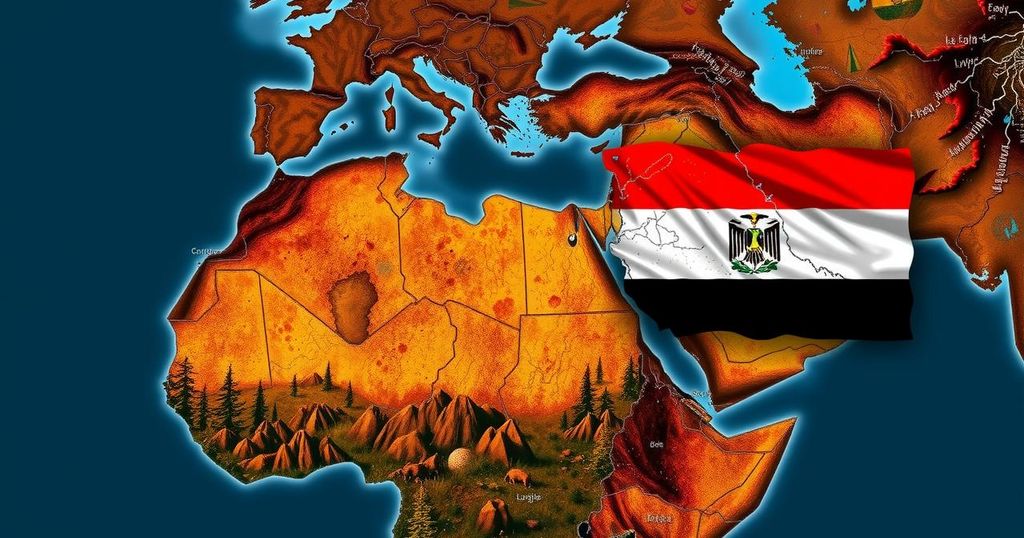In October, Egypt, Eritrea, and Somalia held a summit pledging military cooperation against terrorism, as part of Egypt’s strategy to counter Ethiopia’s growing influence following its military agreement with Somaliland. The ongoing conflict over the Grand Ethiopian Renaissance Dam and the Entebbe Agreement heightens regional tensions, prompting Egypt to solidify military alliances and reach out to its neighbors to reclaim its strategic position in the Horn of Africa.
In early October, a trilateral summit was convened in Asmara, bringing together the presidents of Egypt, Eritrea, and Somalia. During this summit, these leaders expressed their commitment to bolster Somalia’s counterterrorism initiatives by pledging military support and agreeing to the deployment of troops as part of the African Union mission. This development is largely viewed as Egypt’s strategic countermeasure to address Ethiopia’s expanding influence in the region, especially following Ethiopia’s agreement with Somaliland earlier in the year, which involved a coastal lease in exchange for the recognition of Somaliland’s independence. Egypt’s strained relationship with Ethiopia has persisted for years, primarily due to the Grand Ethiopian Renaissance Dam (GERD), which Cairo perceives as a significant threat to its national water security. Concurrently, the recently enacted Entebbe Agreement concerning the management of the Nile River waters has heightened concerns for both Egypt and Sudan. This agreement took effect in early October, and both nations regard it as a potential jeopardy to their vital water resources. The Asmara summit exemplifies Egypt’s endeavor to reconstruct its alliances within Africa through strategic diplomatic and military partnerships, as articulated by Iman Abdel Azim, a political science professor at Cairo University. She noted, “Egyptian decision-makers have placed growing emphasis on building stronger relations with African nations since 2019.” In line with this strategy, Egypt and Somalia previously signed a joint military defense agreement in August 2023, soon followed by shipments of military equipment to support Somalia’s defense capabilities. Additionally, Egypt formalized a defense pact with Eritrea, complemented by a series of diplomatic dialogues, while President Abdel Fattah el-Sisi emphasized military collaboration with Uganda’s Chief of Defence Forces. Amani El-Tawil, Director of the African Program at Al-Ahram Centre for Political and Strategic Studies, pointed out that Egypt’s strategic alliances in Africa have evolved, incorporating military and security dimensions to counter Ethiopia’s aspirations in the Horn of Africa. She remarked on Ethiopia’s unilateral actions regarding the GERD and its influence in neighboring South Sudan, which formulated part of the rationale for Egypt’s current military diplomacy. The GERD has transitioned from a developmental initiative to a project imbued with nationalistic intent, as articulated by Abbas Sharaky, a professor of water resources at Cairo University. He emphasized the adverse impact of the dam’s filling on Egypt’s water supply, stating, “Every cubic meter of water stored in the GERD was water destined for Egypt.” This necessitates Egypt to tap into reserves from the Aswan High Dam to mitigate the water shortfall, a measure that highlights Egypt’s desperate efforts to navigate this crisis. The failure of prolonged negotiations over Nile waters, compounded by high-level agreements such as the Entebbe Agreement, has led to calls for Egypt to adopt a more decisive stance. Former diplomat Ambassador Mona Omar noted, “We have tried for 13 years to reach a cooperative agreement, and now we have no other options.” Following the agreement’s ratification by various Nile Basin states, including a recent approval by South Sudan, experts agree that Egypt’s regional leverage has diminished since the era of former President Gamal Abdel Nasser, who substantially engaged African nations post-independence.
The geopolitical landscape in the Horn of Africa is shaped significantly by the relationship between Egypt and Ethiopia, particularly regarding water security issues tied to the Nile River. For years, Egypt has contested Ethiopia’s construction of the Grand Ethiopian Renaissance Dam, categorizing it as a threat to its rights over Nile waters. The Asmara summit marks a notable response in Egypt’s efforts to rekindle alliances in the region as it perceives Ethiopia’s movements, including military agreements with adjacent regions like Somaliland, as aggressive actions leading to potential instability. This climate has spurred Egypt to solidify its military presence and partnerships in neighboring countries, signaling a shift in focus to bolster its strategic interests in the face of Ethiopia’s expanding influence.
In conclusion, Egypt’s recent diplomatic and military maneuvers in the Horn of Africa reflect a calculated response to what it sees as Ethiopia’s encroaching influence and threats to its vital water security. The trilateral summit in Asmara and subsequent military agreements with Somalia and Eritrea illustrate Egypt’s determination to form a coalition to counter Ethiopian ambitions linked to the controversial GERD and the Entebbe Agreement. As regional dynamics evolve, it becomes increasingly evident that Egypt is reasserting its influence in Africa, attempting to regain the stature it had lost in previous decades.
Original Source: www.newarab.com






